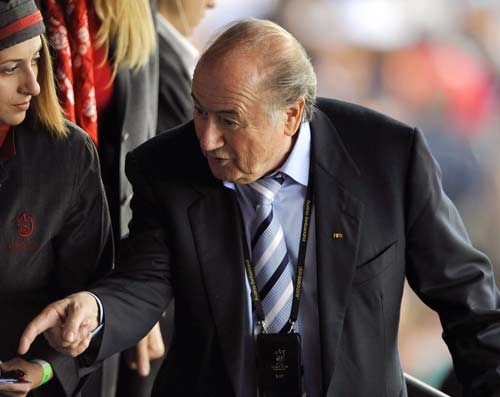Blatter buoyed by 6+5 report

Your support helps us to tell the story
From reproductive rights to climate change to Big Tech, The Independent is on the ground when the story is developing. Whether it's investigating the financials of Elon Musk's pro-Trump PAC or producing our latest documentary, 'The A Word', which shines a light on the American women fighting for reproductive rights, we know how important it is to parse out the facts from the messaging.
At such a critical moment in US history, we need reporters on the ground. Your donation allows us to keep sending journalists to speak to both sides of the story.
The Independent is trusted by Americans across the entire political spectrum. And unlike many other quality news outlets, we choose not to lock Americans out of our reporting and analysis with paywalls. We believe quality journalism should be available to everyone, paid for by those who can afford it.
Your support makes all the difference.Fifa president Sepp Blatter has claimed a victory in his battle to limit the number of foreign players in matches.
A report by the Institute for European Affairs (INEA) - commissioned by Fifa to study the issue - claims the idea of restricting foreign players in league games through the '6+5' rule does not fall foul of EU rules on free movement of workers.
Blatter was delighted at the findings, saying: "This study confirms that we are not breaching European law in defending the 6+5 rule.
"On behalf of Fifa and its member associations, I would like to express my pleasure at this finding.
"Through 6+5 we wish to encourage the development of young players, protect national teams and maintain competitiveness and the unpredictability of results. This is why 6+5 is beneficial to football."
The INEA's findings will now form the basis of fresh talks between Fifa and the European Commission.
The study was carried out by five professors, all experts in European law, and INEA chairman Professor Jurgen Gramke insisted the report, although commissioned by Fifa, was entirely independent.
The key point is that under Fifa's 6+5 proposals, each club must field at least six players eligible for the national team in the starting XI, but there is no limit on substitutes being foreign, or on the number of foreigners in a squad.
So far, the EC and most EU governments say it would amount to discrimination at work and a restriction on the free movement of workers.
Gramke said however: "There is no conflict with European law."
He added: "We took no instructions from Fifa. INEA accepted this commission on condition that our requirements of complete independence were met."
The report says that, under EU law, the "regulatory autonomy" of sporting associations is recognised and supported.
"The key aim of the 6+5 rule in the view of the experts is the creation and assurance of sporting competition," it says.
"The 6+5 rule does not impinge on the core area of the right to freedom of movement. The rule is merely a rule of the game declared in the general interest of sport in order to improve the sporting balance between clubs and associations."
Fifa's Congress endorsed the rule in May last year, but six months later EU ministers said it clearly broke EU rules.
Today's report says that, at worst, the 6+5 rule could constitute "indirect discrimination" because "it is not directly based on the nationality of professional players".
Instead it "merely considers entitlement to play for the national team concerned, and any possible indirect discrimination can be defended on the basis of compelling reasons of general interest".
At the moment, quota systems in football are outlawed, thanks to a European Court ruling in 1995 known as the Bosman Case.
It declared illegal the system, then in operation in many national leagues and in Uefa club competitions, which allowed only three "foreign" players in a team.
The Bosman judgment had a dramatic effect on football, said today's report, opening up the use of foreign players to such a degree that up to 56 per cent of players are now not eligible to play for the national team of the league in which they play. In addition, up to half of the "foreign" players are "non-European".
Join our commenting forum
Join thought-provoking conversations, follow other Independent readers and see their replies
Comments